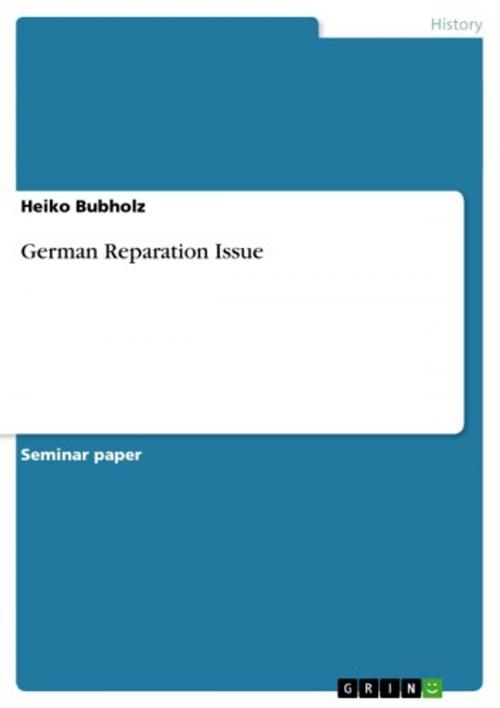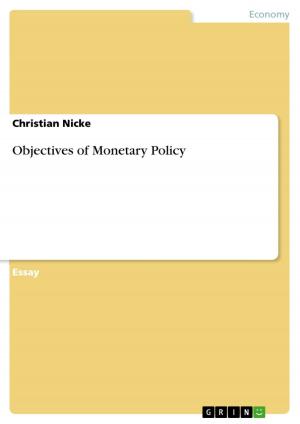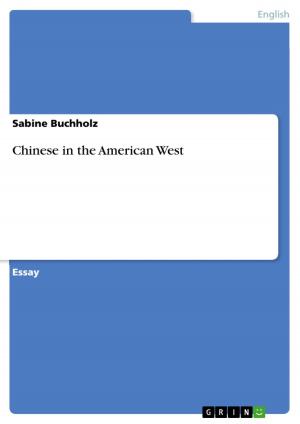| Author: | Heiko Bubholz | ISBN: | 9783638133814 |
| Publisher: | GRIN Publishing | Publication: | July 19, 2002 |
| Imprint: | GRIN Publishing | Language: | English |
| Author: | Heiko Bubholz |
| ISBN: | 9783638133814 |
| Publisher: | GRIN Publishing |
| Publication: | July 19, 2002 |
| Imprint: | GRIN Publishing |
| Language: | English |
Seminar paper from the year 2002 in the subject History Europe - Germany - World War I, Weimar Republic, grade: 1 (A), Jagiellonian University in Krakow (Centre for European Studies), course: Social and Political History of Central and Eastern Europe in 19 Century, 24 entries in the bibliography, language: English, abstract: The period of the Weimar Republic is one of the most piquant chapters in German history. Apart from the tyrannical Nazi regime it might be the most elaborated fraction of Germany's modern history. The reason appears in retrospective: the stormy times of the Weimar Republic provided the ground, from which the Third Reich took of. The Weimar Republic and German revisionist tendencies originated in Versailles. The Allies' goodwill imbued there could have led to a potential pleasing result in from of a real and just peace treaty. A new area in international relations in form of the League of Nations suffered from the beginning of the talks under the national interests of the allied nations.One result of the spoilt peace conference shall be subject of this paper: The question of reparation, linked to the so-called war guild clause caused from the proclamation of the Weimar Republic powerful political problems in domestic and foreign policy of the young German democracy. Simultaneously it sparked an internal struggle, which in the end led to the dissolving of the so hopeful spring of Germany's first democratic republic - eventually persuading into Europe's catastrophe in form of the Third Reich. Thus, I want to elaborate in the following chapters, how the so-called 'Reparationsproblem' influenced German domestic and foreign policy, and how this particular section of the Versailles Peace Treaty interfered in the economic, social, and political decision making process. From the present day's perspective it is hardly questionable, why Hitler followed the weakened and unhealthy Weimar Republic. Therefore it shall be part of the following discussion if this occurrence was inevitable in the course of Europe's history. The devoted reader might be aware, that most of the domestic contemporary literature is more or less heavily biased by national and nationalistic attitude. Even politicians like Stresemann, widely perceived as skilled, cautious, and co-operative, followed their aim of restoration of Germany in the 1914's setting, but in a rather pragmatic way1. [...] ______ 1 Kissinger (1994), p. 283.
Seminar paper from the year 2002 in the subject History Europe - Germany - World War I, Weimar Republic, grade: 1 (A), Jagiellonian University in Krakow (Centre for European Studies), course: Social and Political History of Central and Eastern Europe in 19 Century, 24 entries in the bibliography, language: English, abstract: The period of the Weimar Republic is one of the most piquant chapters in German history. Apart from the tyrannical Nazi regime it might be the most elaborated fraction of Germany's modern history. The reason appears in retrospective: the stormy times of the Weimar Republic provided the ground, from which the Third Reich took of. The Weimar Republic and German revisionist tendencies originated in Versailles. The Allies' goodwill imbued there could have led to a potential pleasing result in from of a real and just peace treaty. A new area in international relations in form of the League of Nations suffered from the beginning of the talks under the national interests of the allied nations.One result of the spoilt peace conference shall be subject of this paper: The question of reparation, linked to the so-called war guild clause caused from the proclamation of the Weimar Republic powerful political problems in domestic and foreign policy of the young German democracy. Simultaneously it sparked an internal struggle, which in the end led to the dissolving of the so hopeful spring of Germany's first democratic republic - eventually persuading into Europe's catastrophe in form of the Third Reich. Thus, I want to elaborate in the following chapters, how the so-called 'Reparationsproblem' influenced German domestic and foreign policy, and how this particular section of the Versailles Peace Treaty interfered in the economic, social, and political decision making process. From the present day's perspective it is hardly questionable, why Hitler followed the weakened and unhealthy Weimar Republic. Therefore it shall be part of the following discussion if this occurrence was inevitable in the course of Europe's history. The devoted reader might be aware, that most of the domestic contemporary literature is more or less heavily biased by national and nationalistic attitude. Even politicians like Stresemann, widely perceived as skilled, cautious, and co-operative, followed their aim of restoration of Germany in the 1914's setting, but in a rather pragmatic way1. [...] ______ 1 Kissinger (1994), p. 283.















